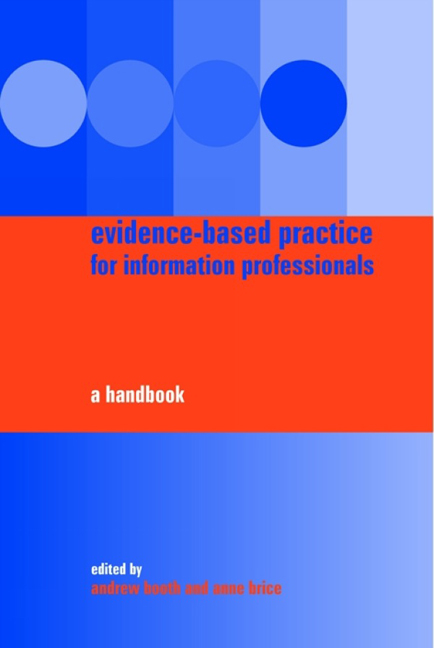Book contents
- Frontmatter
- Contents
- Foreword
- Editors and contributors
- Part 1 The context for evidence-based information practice
- Part 2 Skills and resources for evidence-based information practice
- 6 Formulating answerable questions
- 7 Identifying sources of evidence
- 8 Searching the library and information science literature
- 9 Appraising the evidence
- 10 Applying evidence to your everyday practice
- 11 Evaluating your performance
- 12 Disseminating the lessons of evidence-based practice
- Part 3 Using the evidence base in practice
- Index
7 - Identifying sources of evidence
from Part 2 - Skills and resources for evidence-based information practice
Published online by Cambridge University Press: 08 June 2018
- Frontmatter
- Contents
- Foreword
- Editors and contributors
- Part 1 The context for evidence-based information practice
- Part 2 Skills and resources for evidence-based information practice
- 6 Formulating answerable questions
- 7 Identifying sources of evidence
- 8 Searching the library and information science literature
- 9 Appraising the evidence
- 10 Applying evidence to your everyday practice
- 11 Evaluating your performance
- 12 Disseminating the lessons of evidence-based practice
- Part 3 Using the evidence base in practice
- Index
Summary
Introduction
Evidence-based information practice is no different from any other evidence-based speciality in requiring a thorough search of information resources relevant to the topic in question, in order to identify evidence and, subsequently, put it into practice. The evidence base can be identified through published and unpublished literature with the main sources taking the form of bibliographic databases and journals.
As a profession, librarians spend a large proportion of their time assisting users to identify appropriate information resources for their query. Subsequently they also devote a great deal of effort to training users in search methods and utilization of the resources to their greatest effect. How much time, and to what effect, do information professionals spend developing their skills in interrogating resources relevant to their own profession?
The multifaceted nature of librarianship and information science (LIS) means that the evidence base is contained in multiple and varied information resources. However, only a handful of papers address methods for accessing and interrogating the library literature (Crumley and Koufogoiannakis, 2002; Eldredge, 2000; McKibbon et al., 1999; Yerkey and Glogowski, 1990). It remains unclear which sources are most useful in this quest and what their relative advantages and disadvantages might be. This lack of clarity may compound the fact that information professionals are not enthusiastic consumers of LIS research (see Chapter 5) (Booth, 2000; Turner, 2002).
Scenario
You are a children's librarian within a public library service and have been seconded for two days a week to work on a project investigating the use of ICT in reader development. The library service wishes to develop an interactive web-based package to support the reading development of children. The package will also support writing and computer literacy skills. One of your first tasks is to complete the project initiation document.
Scenarios such as the one above will be familiar to many of you. As the librarian in the scenario you would perhaps want to consult the literature to identify similar initiatives to inform the development of your project and the writing of your document. To assist those of you seeking to develop an evidence-based approach to your practice this chapter identifies and presents a summary of information resources pertinent to evidence-based information practice.
- Type
- Chapter
- Information
- Evidence-based Practice for Information ProfessionalsA Handbook, pp. 71 - 88Publisher: FacetPrint publication year: 2004
- 2
- Cited by



